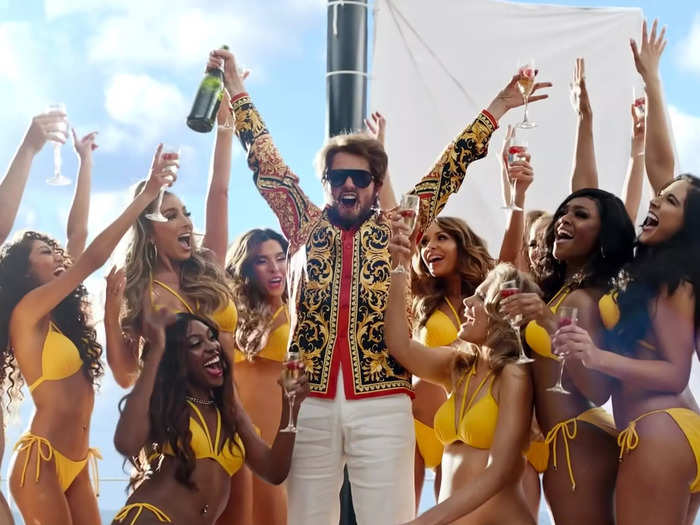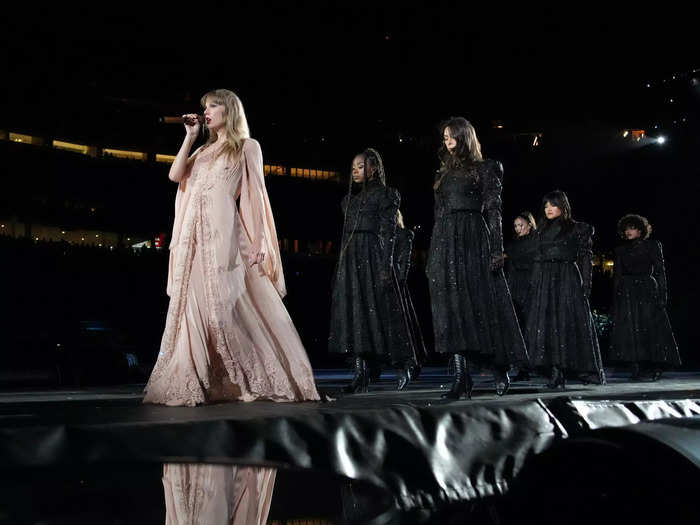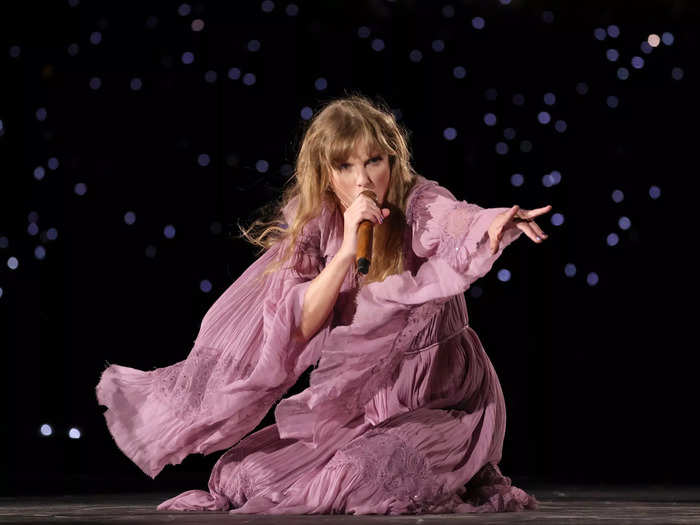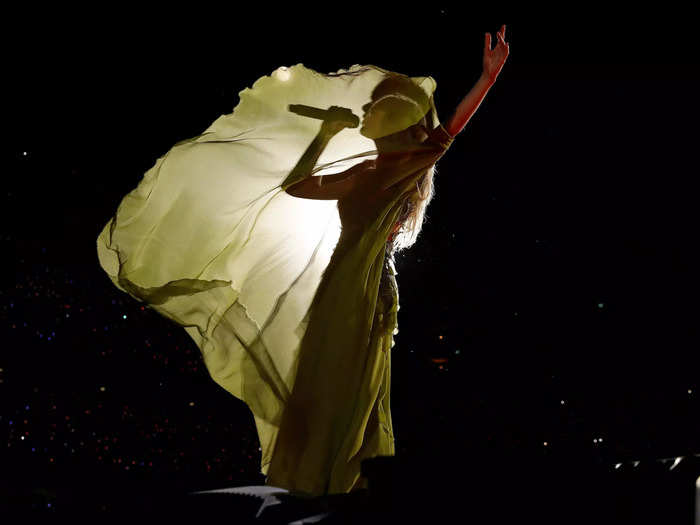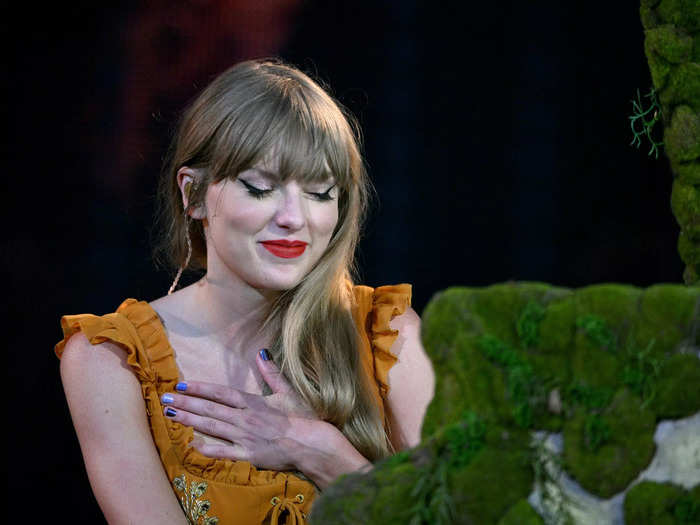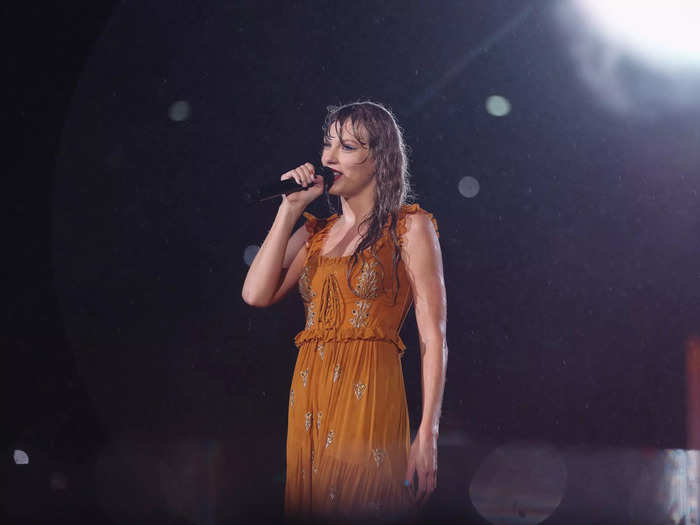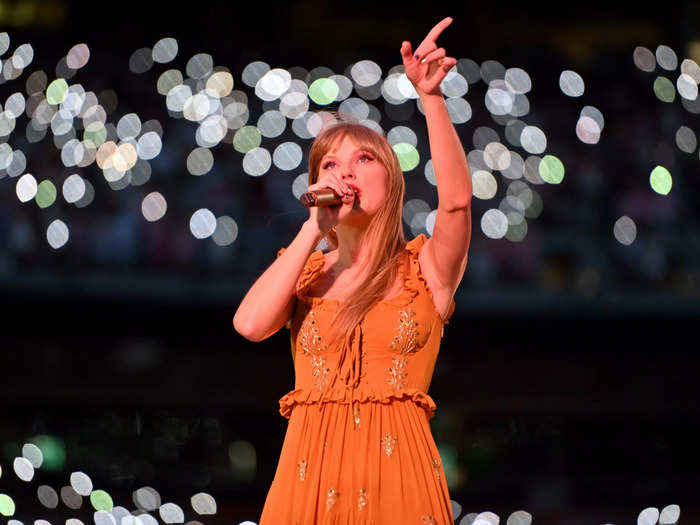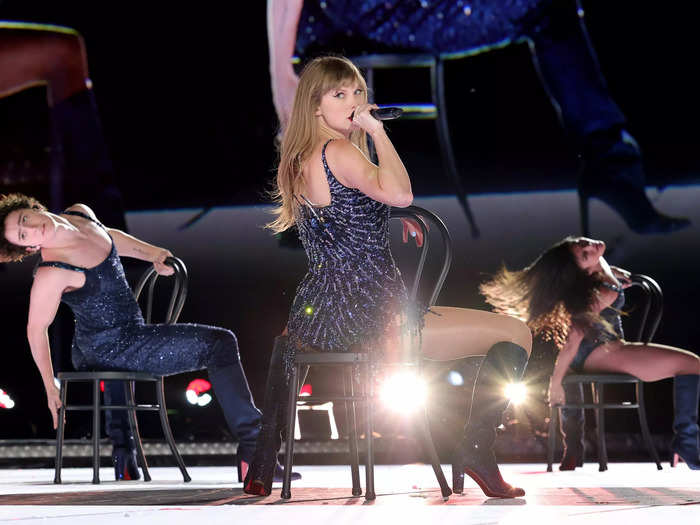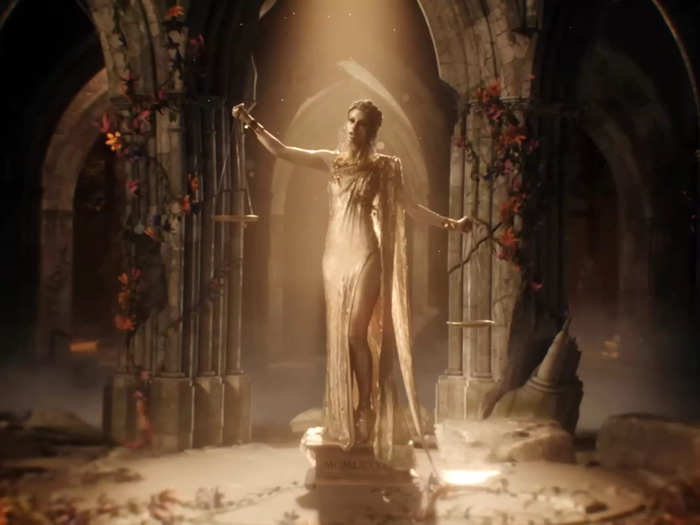Taylor Swift performs during the Eras Tour and Scooter Braun speaks at the 2023 Billboard Power 100 Event.John Shearer/TAS23/Christopher Polk/Billboard via Getty Images
- Scooter Braun is reportedly losing a slew of A-list clients, including Justin Bieber and Ariana Grande.
- Taylor Swift previously accused Braun of "bullying" when he purchased her masters in 2019.
Scooter Braun is back in the news this week as his empire may be in jeopardy.
Several key players in Braun's roster, including Justin Bieber, Ariana Grande, and Demi Lovato, have reportedly severed ties with the A-list manager.
The apparent exodus comes less than three years after Braun made millions by selling Taylor Swift's masters. By Swift's own account, she and Braun had a fraught history before he acquired her back catalog in a deal with Scott Borchetta, the CEO of Big Machine Records, Swift's former label.
"Everyone in my team knew if Scooter Braun brings us something, do not bring it to me," she told Rolling Stone in 2019. "The fact that those two are in business together after the things he said about Scooter Braun — it's really hard to shock me. And this was utterly shocking. These are two very rich, very powerful men, using $300 million of other people's money to purchase, like, the most feminine body of work."
The self-described "betrayal" drove Swift to rerecord her first six albums in order to reclaim ownership of her music, a plan that she announced exactly four years ago, down to the week.
The new reports swirling around Braun's clientele have inspired Swift's fans to celebrate "Tayvoodoo" online, speculate about the singer's "witchcraft," and circulate lyrics from her single "Karma."
Indeed, Swift has written several songs that appear to reference her public battle with Braun. We broke down the most obvious examples below.
"The Man"
"The Man" is the fourth track on "Lover." Taylor Swift/YouTube
Swift wrote "The Man" for her seventh studio album, "Lover," her first release after leaving Big Machine Records. Swift's new contract with UMG allows her to retain the rights to all new music.
"It was a song that I wrote from my personal experience, but also from a general experience that I've heard from women in all parts of our industry," Swift told Billboard of "The Man."
"We have to curate and cater everything, but we have to make it look like an accident. Because if we make a mistake, that's our fault, but if we strategize so that we won't make a mistake, we're calculating," she continued.
The song imagines how Swift's career, dating life, and personality would be perceived if she were a man instead of a woman.
For the music video, Swift used prosthetics to transform into a man. In one scene, her male character pees on a subway wall, graffitied with the titles of her albums that Braun purchased. The wall also bears a "missing" poster ("If found return to Taylor Swift") and a "no scooters" sign, clearly referencing her conflict with Braun.
Swift also sang "The Man" to open a career-spanning medley at the 2019 American Music Awards, where she was honored as the artist of the decade.
Before the show, she said that Braun and Borchetta were attempting to block her from performing old music, sparking a slew of fan petitions in Swift's defense.
"My Tears Ricochet"
"My Tears Ricochet" is the fifth track on "Folklore." Jeff Kravitz/TAS23/Getty Images for TAS Rights Managemen
"My Tears Ricochet" was the first song Swift wrote for "Folklore," her eighth album.
In the Disney+ documentary "Folklore: The Long Pond Studio Sessions," Swift described "My Tears Ricochet" as a song about karma, greed, and betrayal.
"It's a song about how somebody could be your best friend and your companion and your most-trusted person in your life, and then they could go and become your worst enemy, who knows how to hurt you because they were once your most-trusted person," she said.
The song can be interpreted in a myriad of ways, but Swift was most likely referring to Borchetta, who signed her when she was just a teenager.
In her 2019 interview with Rolling Stone, Swift said that Borchetta's decision to work with Braun was a "redefinition of betrayal" because she felt like he was her family.
"When you have a business relationship with someone for 15 years, there are going to be a lot of ups and a lot of downs," she said. "But I truly, legitimately thought he looked at me as the daughter he never had."
Swift added: "To go from feeling like you're being looked at as a daughter to this grotesque feeling of 'Oh, I was actually his prized calf that he was fattening up to sell to the slaughterhouse that would pay the most.'"
The title of "My Tears Ricochet" is a reference to Swift's own songwriting — how she can turn her sadness into music that ripples through culture, coming back to haunt the people who hurt her.
"You wear the same jewels that I gave you / As you bury me," as well as the line about "stolen lullabies," could refer to Swift's high-selling albums that were, at the time of the song's release, still owned by Braun.
"Mad Woman"
"Mad Woman" is the 12th track on "Folklore." John Shearer/TAS23/Getty Images for TAS Rights Management
Many fans believe that "Mad Woman" was inspired by the sale of Swift's master recordings and what she has described as Braun's "shameless greed."
The song paints a woman's madness as the direct result of a man's actions (or, at least, the patriarchy at large).
"Now I breathe flames each time I talk / My cannons all firing at your yacht / They say 'move on,' but you know I won't," she sings in the second verse.
The yacht indicates the ire of Swift's fury is extremely wealthy, which Braun certainly is; he reportedly paid over $300 million for Big Machine Records and Swift's back catalog.
In the bridge, Swift sings of how this man "took everything from me" using cruelty and disrespect ("Watching you climb over people like me").
In a 2022 investigation into Braun's empire, Insider's Anna Silman found that Braun is known in the music industry as relentless, egotistical, and "one of the most cutthroat people in the business."
Swift also refers to her enemy as "the master of spin," which could be a reference to Braun's role as a celebrity manager, working to reframe coverage to make his clients look better. In the world of media and politics, "spin" is a form of propaganda.
"The master of spin has a couple side flings / Good wives always know / She should be mad, should be scathing like me, but / No one likes a mad woman," Swift sings.
The year after "Mad Woman" was released, Braun and his wife separated amid rumors that he had an affair with "Real Housewives of Beverly Hills" star Erika Jayne. (Jayne has denied it.)
"Peace"
"Peace" is the 15th track on "Folklore." Natasha Moustache/TAS23/Getty Images for TAS Rights Management
"Peace" is not about Braun per se, but it does examine the stress and conflict that comes hand-in-hand with Swift's fame. (In 2020, she described the song as "rooted in my personal life.")
"But there's robbers to the east, clowns to the west / I'd give you my sunshine, give you my best / But the rain is always gonna come if you're standing with me," she sings in the second verse.
The "robbers" probably refer to Borchetta and Braun. She seems to view their ownership of her music as little more than theft (see also: "stolen lullabies" in "My Tears Ricochet").
The "clowns to the west" may be a cheeky reference to Kim Kardashian and Ye, formerly known as Kanye West, who were Swift's adversaries in another high-profile feud.
"Long Story Short"
"Long Story Short" is the 12th track on "Evermore." Fernando Leon/TAS23/Getty Images for TAS Rights Management
In "Long Story Short," Swift reflects on the mistakes and setbacks she has experienced in her career — and how she has emerged stronger and wiser.
"I wanna tell you not to get lost in these petty things," she sings in the bridge. "Your nemeses will defeat themselves before you get the chance to swing."
The "nemeses" could refer to several people, but given Swift's many negative words about him, Braun is surely one of them.
"Closure"
"Closure" is the 14th track on "Evermore." TAS Rights Management/Getty Images
In a 2020 interview with Apple Music, Swift said that "Closure" sums up the overarching theme of her ninth album: "'Evermore' deals a lot in endings of all sorts, shapes, and sizes, all the kinds of ways we can end a relationship, a friendship, something toxic, and the pain that goes along with that."
Many believe "Closure" was inspired by Karlie Kloss, Swift's former best friend who worked with Braun for several years.
When Swift spoke out against Braun's purchase of her music, famous friends rushed to her defense. Kloss did not.
The two women haven't been seen together since 2018. Neither Swift nor Kloss have publicly addressed their apparent falling-out, but fans have theorized that Kloss' connection to Braun put strain on their relationship.
"I know I'm just a wrinkle in your new life / Staying friends would iron it out so nice," Swift sings in the bridge. "Guilty, guilty, reaching out across the sea / That you put between you and me / But it's fake and it's oh so unnecessary."
The song could also be about Braun himself. He has said he "regrets" how he handled the acquisition of Swift's catalog, adding that he "asked for her to sit down with me several times, but she refused."
"It's Time to Go"
"It's Time to Go" is the 17th track on "Evermore (Deluxe Version)." Tom Cooper/TAS23/Getty Images for TAS Rights Management
"It's Time to Go," one of two deluxe "Evermore" tracks, is a list of situations that induce "that old familiar body ache," when the better and stronger choice is to walk away.
The third verse recounts Swift's decision to leave Big Machine Records after 15 years. In her open letter about Borchetta and Braun's partnership, Swift said that she "pleaded for a chance to own my work."
Instead, when her contract expired, she said that Borchetta offered her the opportunity to earn the rights to one album at a time in exchange for every new one she produced.
"I walked away because I knew once I signed that contract, Scott Borchetta would sell the label, thereby selling me and my future," Swift wrote. "I had to make the excruciating choice to leave behind my past. Music I wrote on my bedroom floor and videos I dreamed up and paid for from the money I earned playing in bars, then clubs, then arenas, then stadiums."
She added: "Thankfully, I left my past in Scott's hands and not my future."
In "It's Time to Go," Swift implies that Borchetta kept her own music hostage, "frozen behind glass," to entice her to stay with the label.
"Fifteen years, 15 million tears / Begging 'til my knees bled / I gave it my all, he gave me nothing at all / Then wondered why I left," she sings. "Now he sits on his throne in his palace of bones / Praying to his greed / He's got my past frozen behind glass / But I've got me."
"Vigilante Shit"
"Vigilante Shit" is the eighth track on "Midnights." Kevin Mazur/TAS23/Getty Images for TAS Rights Management
"Vigilante Shit" is the only solo-written song on Swift's 10th studio album "Midnights." It's also the song that seems most directly inspired by Braun.
Swift describes the song's subject as a liar and manipulator, similar to how she has described Braun in real life.
She also accuses her rival of "doing lines" (snorting cocaine) and committing "white-collar crimes," possibly referencing a $200 million lawsuit that was filed against Braun in 2021, accusing him of fraud, breach of fiduciary duty, and breach of contract.
"She needed cold, hard proof, so I gave her some / She had the envelope, where you think she got it from? / Now she gets the house, gets the kids, gets the pride," Swift sings in the second verse.
Shortly before the release of "Midnights," Braun finalized his divorce from Yael Cohen, with whom he shares three children.
"Karma"
"Karma" is the 11th track on "Midnights." Taylor Swift/YouTube
"Karma" is a song about, you guessed it, karma. But more specifically, it's about Swift's continued success and the inevitable downfall of her enemies.
"You're terrified to look down / 'Cause if you dare, you'll see the glare / Of everyone you burned just to get there," she sings, recalling a key line in "Mad Woman," as well as the scorched-earth tactics that Braun is reportedly known for, according to Insider's investigation.
"I've never seen anyone burn so many bridges with so many people," a person familiar with Braun's business dealings said.
In the second verse of "Karma," Swift refers to a "Spider Boy, king of thieves."
Not only does "Spider Boy" share the same initials as Scooter Braun, but once again, Swift likens Braun's purchase (and subsequent sale) of her catalog to robbery.
"My pennies made your crown / Trick me once, trick me twice / Don't you know that cash ain't the only price? / It's coming back around," she sings.

